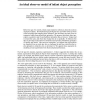504 search results - page 32 / 101 » The Consistency of the CADIAG-2 Knowledge Base: A Probabilis... |
WCRE
2000
IEEE
14 years 1 months ago
2000
IEEE
Reverse engineering is an imperfect process driven by imperfect knowledge. Most current reverse engineering tools do not adequately consider these inherent characteristics. They f...
AGILE
2007
Springer
2007
Springer
Towards Spatial Reasoning in the Semantic Web: A Hybrid Knowledge Representation System Architecture
14 years 3 months ago
Environmental databases store a wide variety of data from heterogeneous sources which are described with domain-specific terminologies and refer to distinct locations. In order to ...
KDD
2005
ACM
14 years 2 months ago
2005
ACM
Data clustering represents an important tool in exploratory data analysis. The lack of objective criteria render model selection as well as the identification of robust solutions...
BIBE
2004
IEEE
14 years 16 days ago
2004
IEEE
This research explores the feasibility of semantic similarity approaches to supporting predictive tasks in functional genomics. It aims to establish potential relationships betwee...
NIPS
2008
13 years 10 months ago
2008
Before the age of 4 months, infants make inductive inferences about the motions of physical objects. Developmental psychologists have provided verbal accounts of the knowledge tha...

